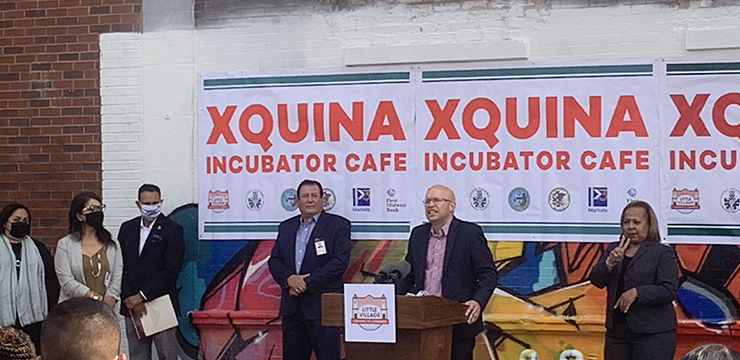Free online dashboard curates data sets from leading sources in one portal, offering neighborhood snapshots of economic opportunity, education, and health and wellness and saving time and resources for nonprofits, community groups and policymakers
As Chicago’s neighborhoods continue to suffer through the harshness of COVID-19’s health, social, and economic impacts, Heartland Alliance and the Robert R. McCormick Foundation have launched the Chicago Community Data Portal. This portal will help community leaders, grassroots organizations and policymakers understand the full impact of the turmoil of 2020 and chart a course to ensure that resources are allocated where they are most needed. This dynamic tool has urgent benefit now and will be a valuable resource going forward.
The dashboard, located at www.heartlandalliance.org/ChicagoData, offers a unique opportunity to track how key outcomes change over time, to compare a community’s wellbeing to its neighbors and the city overall, to understand racial and gender disparities within and across communities and to inform decisions about how to target resources and
programs, and how to advocate for neighborhood resources.
Users can view the best neighborhood-level data culled from trusted original data sources including the Census’ American Community Survey, the Illinois State Board of Education, Chicago Public Schools, the Chicago Health Atlas, and the Illinois Department of Public Health. The portal was created by Heartland Alliance’s Social IMPACT Research Center, with the support of the McCormick Foundation.
“The Chicago Community Data Portal is a tremendous resource for people working to improve Chicago,” said Katie Buitrago, Director of Research at Heartland Alliance. “It’s a dynamic comparison of neighborhoods’ economic data and social data, and users can drill down on specific issues like homelessness, gun violence, food access, etc. When we have a clearer picture of the societal challenges faced by our communities, we can better plan a path forward.”
With the McCormick Foundation as a partner, Heartland Alliance is committed to keeping the portal up-to-date going forward so decision-makers have current, relevant information. “The idea from the beginning has been to host in one place important information across communities and across several years for all of Chicago’s neighborhoods so we can track trends and identify opportunities,” said Don Cooke of the McCormick Foundation. “We’re eager to share this site with agencies across the city and regularly work with the Heartland research team to continue updating data as we know this tool will have tremendous usefulness for years to come.”
The dashboard is expected to assist community leaders, journalists, researchers, and social service agencies as they assess ongoing community programming trends and future needs and has already received positive early feedback from Chicago community groups:
Katya Nuques – Executive Director of Enlace Chicago: “This user-friendly data helps us plan our programs, write grant reports and proposals, and analyze the gaps in indicators of well-being that shed light in systemic inequities and racial disparities. “It will save my staff time in having to extrapolate the data themselves, so we can
focus more time on serving our community.”
Katie Durrah, Senior Director of Housing and Health at Heartland Human Care Services: “The goal for my work is to mitigate poverty and its root causes, and that means I need to know where the biggest challenges in Chicago are. This dashboard helps me to understand the opportunities our participants have and the racial, gender, and age disparities that they face.”
Kimberlee Guenther, Ph.D., Chief Impact Officer at United Way of Metro Chicago: “The Chicago Community Data Portal is an incredible tool for funders, service providers, and anyone interested in their community’s well-being. At United Way, we will track community conditions over time and encourage our partners to use the contextual data to help tell their stories.”
The Chicago Community Data Portal is the second dashboard provided by the Heartland Alliance’s research initiatives. The Illinois County Well-Being Index portal, which assess key indicators of wellbeing across the state of Illinois, launched in 2019.
“Paired with the Heartland Alliance’s frontline work, our research and policy recommendations for mitigating the COVID-19 crisis are critical to alleviating the impacts of COVID-19,” said Buitrago. “While this data is essential for policymakers and nonprofit organizations at any time, the urgent needs of people across the state who are struggling to make ends meet makes working from a position of knowledge a necessity.”
Virtual Portal Training Webinar
Heartland Alliance will host a Chicago Community Data Portal training webinar on Wednesday, November 18 at 2:30pm, sharing an overview of the tool, a review of the data sources, sample data comparisons, and additional information. To register for the Zoom training, visit: https://www.surveymonkey.com/r/QGJNCW9
About Heartland Alliance for Human Needs and Human Rights
Heartland Alliance, one of the world’s leading antipoverty organizations, works in communities in the U.S. and abroad to serve those who are homeless, living in poverty, or seeking safety. It provides a comprehensive array of services in the areas of economic opportunity, health and well-being, and, safety and justice – and leads state and national policy efforts, which target lasting change for individuals and society.
About The Robert R. McCormick Foundation
The Robert R. McCormick Foundation helps communities in Chicagoland and across Illinois develop educated, informed, and engaged citizens. Through philanthropic grantmaking and Cantigny Park, the Foundation works to strengthen our democracy, and to help ensure that people, especially children, have equitable access to the opportunities they need to flourish. The McCormick Foundation, among the nation’s largest foundations with more than $1.5 billion in assets, was established in 1955 upon the death of Col. Robert R. McCormick, the longtime editor and publisher of the Chicago Tribune. Find out more at www.mccormickfoundation.org.



